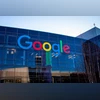)
Former Google executives testified Tuesday and Wednesday about how the company dealt with pricing and competitive technologies. (Photo: Shutterstock)
By Leah Nylen
Eight years ago, Google debated slashing the fees for its advertising exchange — the highest in the industry — after websites developed a way to boost online ad revenue while bypassing the company’s tools, former executives testified as part of a US Justice Department antitrust trial.
Websites selling display ads had developed a new technology, known as header bidding, to try and counter Google’s high fee structure and squeeze more revenue from the transactions. The Alphabet Inc. unit never cut its 20 per cent fee, and instead developed a modified version of the technology in 2019.
In a trial that kicked off this week in federal court in Alexandria, Virginia, antitrust enforcers allege that Google has illegally monopolized the technology used to buy and sell online display advertising.
The company controls a complex pipeline of technology products used by websites to sell space, as well as tools for advertisers and an exchange that connects ad buyers and sellers.
Google’s Dominance
The Justice Department and state attorneys general say that Google’s dominance in the industry has allowed it to overcharge customers, estimating the company keeps between $36 and $37 dollars out of $100 that marketers spend for display ads. They also say the company used its dominance in online ads to keep out rivals.
Government witness Jay Friedman, the CEO of marketing company Goodway Group, which works with advertisers and ad agencies on campaigns, said he was able to negotiate lower rates with several other ad exchanges, but “Google said it wasn’t an option” to lower rates. His company considered not using Google’s ad exchange because of its higher fees, but found the other exchanges couldn’t offer enough advertising supply.
Former Google executives testified Tuesday and Wednesday about how the company dealt with pricing and competitive technologies.
Eisar Lipkovitz, a former vice president of engineering for display and video ads from 2014 to 2019, recalled internal discussions about whether Google should cut the fees charged by its advertising exchange, AdX, ultimately recommending a 10-15 per cent fee. But the 20 per cent fee was never lowered, demonstrating Google’s ability to keep prices high without harming its business, DOJ lawyers alleged.
“I did not have authority to make decisions,” he said in video testimony played in court.
Lipkovitz acknowledged the high Adx fees led websites to adopt header bidding, through which websites conduct ad auctions within the browser as a web page loads, allowing multiple exchanges to compete simultaneously for the ad space.
Header bidding helped publishers boost their revenue by as much as 50 per cent, Stephanie Layser, a former News Corp. executive, testified Tuesday.
Lipkovitz, who left Google in 2019 to join Lyft Inc., said that Google viewed ads sold through header bidding as lower quality, and likely to be impacted by spam and fraud. But Layser, who now works at Amazon.com Inc. and has helped 25 publishers adopt header bidding, said ads sold through Google were just as likely to have problems with spam or fraud.
‘Long-Term Threat’
In internal documents, Google referred to header bidding as a “serious long- term threat” since it could move business away from its ad exchange.
“The problem is that HB exists,” another Google employee wrote, adding a smiley face emoji. “Publishers felt locked in” to Google’s tools “which only gave Adx the ability to compete, so HB was born.”
Brad Bender, Google’s former vice president of product for display and video ads who joined the company when it bought DoubleClick in 2008, testified on Wednesday. He was asked about an email he sent to Google’s entire display ads team with notes from a talk by former DoubleClick CEO David Rosenblatt, outlining the company’s strategy in using its ad server product — known as DoubleClick for Publishers or DFP – to lock in customers.
Websites were unlikely to move away from their ad server because of the “huge switching cost,” Rosenblatt said in the notes. “Switching platforms is a nightmare,” he wrote. “It takes an act of God to do it.”
Because of its access to the publisher ad servers, Google also could get a “first look” at ad space for sale, giving it advantages over other exchanges, Rosenblatt said. “We’ll be able to crush the other networks and that’s our goal.”
(Only the headline and picture of this report may have been reworked by the Business Standard staff; the rest of the content is auto-generated from a syndicated feed.)
First Published: Sep 12 2024 | 8:20 AM IST


































